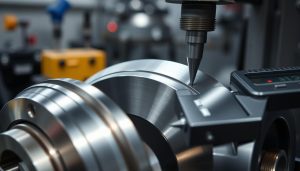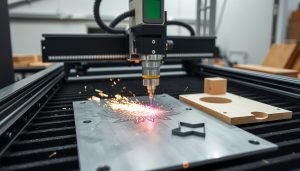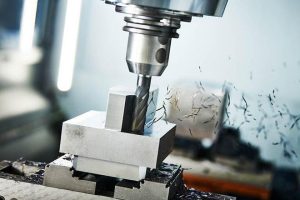In the world of precision manufacturing, tapped holes play a crucial role in ensuring the integrity and functionality of various components. As the landscape of modern engineering continues to evolve, the importance of understanding the intricacies of tapped holes in CNC machining has become increasingly paramount. This article aims to delve into the world of tapped holes, exploring their definition, significance, and the key differences between tapping and threading processes.
What is a Tapped Hole?
In the world of machining and manufacturing, a tapped hole plays a crucial role in creating secure and reliable connections. Tapped holes are internal threads that are cut or formed within a workpiece, allowing for the insertion of a threaded fastener, such as a bolt or screw.
Definition and Importance of Tapped Holes
A tapped hole is a type of internal thread that is machined into a material, typically metal, plastic, or wood. These holes are designed to accommodate threaded fasteners, providing a secure and durable means of attachment. Tapped holes are essential in a wide range of industries, from automotive and aerospace to electronics and consumer products, where the need for strong, reliable connections is paramount.
Tapping vs Threading: Key Differences
While tapped holes and threaded components may seem similar, there are distinct differences between the processes of tapping and threading. Tapping involves the use of a tool called a tap to create internal threads within a pre-drilled hole, while threading is the process of cutting external threads on the surface of a component, such as a bolt or screw. The choice between tapping and threading depends on the specific application and the desired level of strength and durability required for the connection.
- Tapped holes offer a more secure and reliable means of attachment compared to external threads, as the internal threads provide a stronger grip and better resistance to loosening.
- Threading is often used for longer, continuous threads, while tapping is better suited for shorter, more localized thread applications.
- Tapped holes allow for greater flexibility in terms of fastener selection and positioning, as they can accommodate a variety of threaded components.
“Tapped holes are the foundation of many secure and reliable connections in the manufacturing world.”
Understanding the differences between tapped holes and threading is crucial for designers, engineers, and machinists who must select the appropriate method for their specific project requirements. By leveraging the unique advantages of tapped holes, manufacturers can create robust and efficient fastening systems that meet the demands of their industry.
How Tapping Works in Machining
The tapping process is a fundamental operation in CNC machining, allowing for the efficient creation of threaded holes. This technique involves the use of specialized tapping tools to form internal threads within a pre-drilled hole, known as the tap drill size. Understanding the intricacies of the tapping process is crucial for achieving high-quality, durable threaded connections in various manufacturing applications.
Tapping Tools and Techniques
The success of the CNC tapping process relies on the selection and use of the appropriate tapping tools. These tools come in a variety of sizes and thread pitches to accommodate different applications. Tapping can be performed manually or through automated CNC machining, depending on the complexity of the project and the desired precision. Proper tool alignment, rotational speed, and feed rate are essential for creating clean, consistent threads.
Considerations for Hole Size and Thread Compatibility
- The thread pitch, or the distance between adjacent thread crests, is a crucial factor in determining the appropriate tap drill size. Selecting the correct tap drill size ensures a secure and reliable thread fit.
- Careful consideration of the material being tapped, the desired thread depth, and the anticipated load-bearing requirements can also influence the choice of tapping tools and techniques.
- Ensuring compatibility between the tapped hole and the mating threaded component is essential for a successful assembly. Mismatched threads can lead to binding, stripping, or other issues that compromise the integrity of the connection.
By understanding the nuances of the tapping process, manufacturers can optimize their CNC machining operations, delivering high-quality, durable threaded components that meet the demands of various industries.

Advantages of Using Tapped Holes in Manufacturing
Tapped holes offer a range of benefits that make them an invaluable tool in the realm of efficient manufacturing. From quick and reliable thread creation to their versatility in various fastening systems, the advantages of tapped holes are undeniable.
Quick and Reliable Thread Creation
One of the primary advantages of using tapped holes is the speed and reliability with which they can create secure threads. This is particularly beneficial in industries where efficient manufacturing is paramount, as tapped holes allow for a streamlined assembly process without the need for time-consuming threading operations. The precision and consistency of tapped holes ensure a secure fastening every time, enhancing the overall quality and durability of the final product.
Use in Fastening Systems
Tapped holes are widely utilized in a variety of fastening systems across different industries. Their ability to provide a strong and reliable connection makes them an essential component in applications ranging from automotive and machinery to electronics and consumer products. The tapped hole benefits extend beyond just thread creation, as they also contribute to the overall structural integrity and performance of the final assembly.
The advantages of tapped holes in manufacturing are undeniable, from their efficiency in creating secure threads to their versatility in various fastening systems. By leveraging the power of tapped holes, manufacturers can achieve a level of efficient manufacturing and secure fastening that is unparalleled in the industry.

“Tapped holes are the key to unlocking the full potential of efficient manufacturing and secure fastening systems.”
Applications of Tapped Holes in Various Industries
Tapped holes have become an essential component in a wide range of industrial applications, from automotive and machinery to electronics and consumer products. These precision components play a vital role in ensuring the reliability and functionality of diverse products we use every day.
Automotive and Machinery
In the automotive industry, tapped holes are extensively utilized in the manufacturing of engine blocks, transmission housings, and other critical components. They provide a secure and reliable method for fastening parts together, allowing for easy assembly and disassembly during maintenance and repair. Machinery industries, such as those producing agricultural equipment, construction tools, and industrial robots, also heavily rely on tapped holes to ensure the precise alignment and attachment of various precision components.
Electronics and Consumer Products
Tapped holes are equally important in the electronics and consumer products sectors. They are commonly found in the internal structures of laptops, smartphones, and other electronic devices, facilitating the installation of circuit boards, housings, and accessories. In the realm of consumer goods, tapped holes are utilized in the assembly of household appliances, furniture, and sporting equipment, contributing to their industrial applications and overall durability.
| Industry | Tapped Hole Applications | Relevant Tapped Hole Standards |
|---|---|---|
| Automotive | Engine blocks, transmission housings, suspension components | SAE J353, ASME B1.1 |
| Machinery | Agricultural equipment, construction tools, industrial robots | ISO 965, DIN 13 |
| Electronics | Laptop chassis, smartphone housings, circuit board mounting | IPC-A-600, UL 1439 |
| Consumer Products | Household appliances, furniture, sporting equipment | ANSI/ASME B1.1, ISO 261 |
As these examples demonstrate, tapped holes are an integral part of numerous industrial applications and precision components, ensuring the consistent quality and performance of products across diverse sectors. Adherence to relevant tapped hole standards is crucial to maintain the integrity and safety of these essential features.
Why Choose Shixinproto for Tapped Hole Machining Services?
At Shixinproto, we pride ourselves on our expertise in providing top-notch CNC machining services, with a particular emphasis on precision tapping. Our advanced CNC capabilities and stringent quality control measures ensure that every tapped hole we produce meets the highest standards of accuracy and reliability.
Whether you require custom threaded components for the automotive industry, precision-engineered parts for machinery, or intricate threaded designs for consumer electronics, Shixinproto has the skills and experience to deliver exceptional results. Our team of skilled machinists and engineers work tirelessly to understand your unique requirements and translate them into high-quality, functional parts that exceed your expectations.
With years of experience in the field, Shixinproto has established a reputation for delivering unparalleled CNC machining services, including precision tapping, to clients across a wide range of industries. Trust us to be your go-to partner for all your tapped hole machining needs, and let us help you take your products to the next level.





